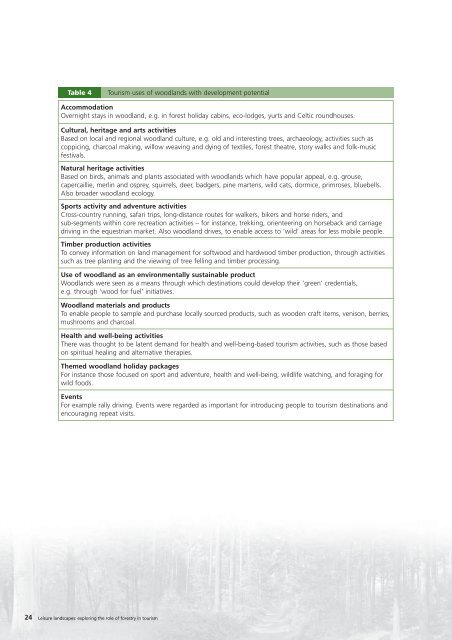Leisure Landscapes
Leisure Landscapes has been providing professional landscaping in Durham NC since 1993. Our landscapers serve Raleigh, Cary, Chapel Hill, Apex and Wake Forest. Our landscaping design services include installation, irrigation and maintenance.
Leisure Landscapes has been providing professional landscaping in Durham NC since 1993. Our landscapers serve Raleigh, Cary, Chapel Hill, Apex and Wake Forest. Our landscaping design services include installation, irrigation and maintenance.
You also want an ePaper? Increase the reach of your titles
YUMPU automatically turns print PDFs into web optimized ePapers that Google loves.
Table 4<br />
Tourism uses of woodlands with development potential<br />
Accommodation<br />
Overnight stays in woodland, e.g. in forest holiday cabins, eco-lodges, yurts and Celtic roundhouses.<br />
Cultural, heritage and arts activities<br />
Based on local and regional woodland culture, e.g. old and interesting trees, archaeology, activities such as<br />
coppicing, charcoal making, willow weaving and dying of textiles, forest theatre, story walks and folk-music<br />
festivals.<br />
Natural heritage activities<br />
Based on birds, animals and plants associated with woodlands which have popular appeal, e.g. grouse,<br />
capercaillie, merlin and osprey, squirrels, deer, badgers, pine martens, wild cats, dormice, primroses, bluebells.<br />
Also broader woodland ecology.<br />
Sports activity and adventure activities<br />
Cross-country running, safari trips, long-distance routes for walkers, bikers and horse riders, and<br />
sub-segments within core recreation activities – for instance, trekking, orienteering on horseback and carriage<br />
driving in the equestrian market. Also woodland drives, to enable access to ‘wild’ areas for less mobile people.<br />
Timber production activities<br />
To convey information on land management for softwood and hardwood timber production, through activities<br />
such as tree planting and the viewing of tree felling and timber processing.<br />
Use of woodland as an environmentally sustainable product<br />
Woodlands were seen as a means through which destinations could develop their ‘green’ credentials,<br />
e.g. through ‘wood for fuel’ initiatives.<br />
Woodland materials and products<br />
To enable people to sample and purchase locally sourced products, such as wooden craft items, venison, berries,<br />
mushrooms and charcoal.<br />
Health and well-being activities<br />
There was thought to be latent demand for health and well-being-based tourism activities, such as those based<br />
on spiritual healing and alternative therapies.<br />
Themed woodland holiday packages<br />
For instance those focused on sport and adventure, health and well-being, wildlife watching, and foraging for<br />
wild foods.<br />
Events<br />
For example rally driving. Events were regarded as important for introducing people to tourism destinations and<br />
encouraging repeat visits.<br />
24 <strong>Leisure</strong> landscapes: exploring the role of forestry in tourism


